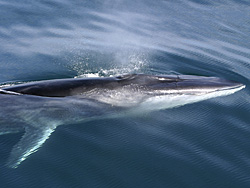
I was fascinated by an article in Tuesday's Science Times about the eating habits of baleen whales. Apparently, a group of marine biologists were studying several baleen whales and trying to record the latest hit Fin Whale Song. But the whales they found weren't singing, they were hungry.
Their study may have been considered wasted time except another biologist recognized that this was the first analyzable data of these whales feeding. It turns out that most of the suppositions about how these giants feed were all wrong. What they do is launch themselves hundreds of feet down into schools of krill -- tiny shrimplike creatures that are the favorite meal of fin whales -- but as they approach, they open their large mouth, which acts like a parachute to slow the whale down. This massive creature can stop on a dime -- well, it takes three seconds, which is mighty fast when you're talking about an 80-ton finback; your train doesn't do that. This is pretty interesting stuff to a whale geek like me.
I might have let it go at that, but then I received an email from one of my brothers noting the excellent crossword puzzle word that the article included: "rorqual," which is a group of baleen whales that includes the fin whale, the Minke whale, the humpback, and the blue whale. I went to Wikipedia to learn a little more about rorquals and discovered that there's another type of whale in there that I'd never heard of. It's called Balaenoptera omurai and it was only discovered four years ago in waters outside Japan. Whether it's a distinct species has yet to be determined, but it resembles a fin whale, only smaller. According to the wikipedia entry, it's likely to be called Omura's Whale, after the Japanese cetologist who discovered it.
To me, this little experience is a perfect example of how newspapers, simple curiosity, and the Internet blend to educate the world. Pretty deep stuff.
No comments:
Post a Comment